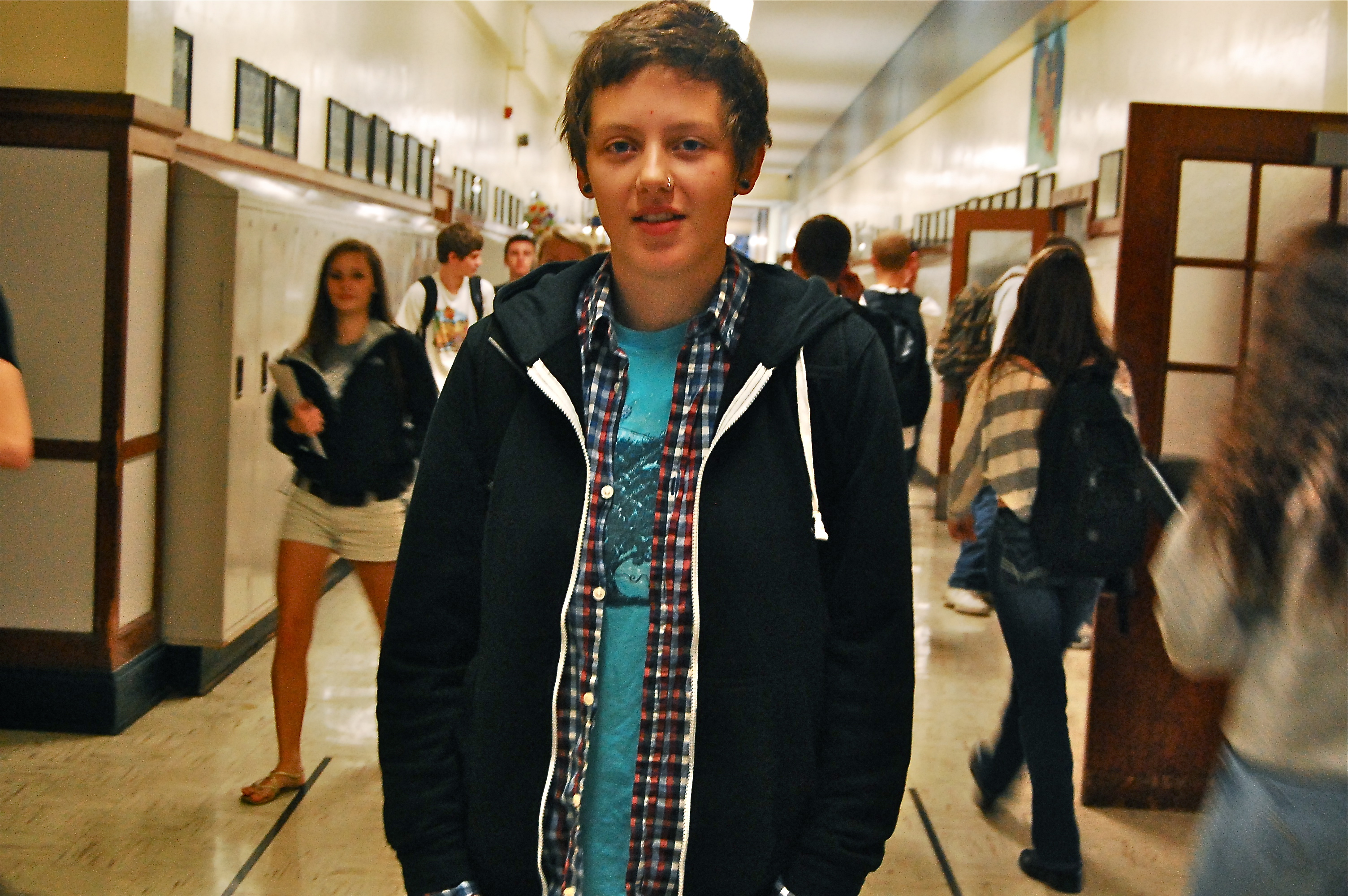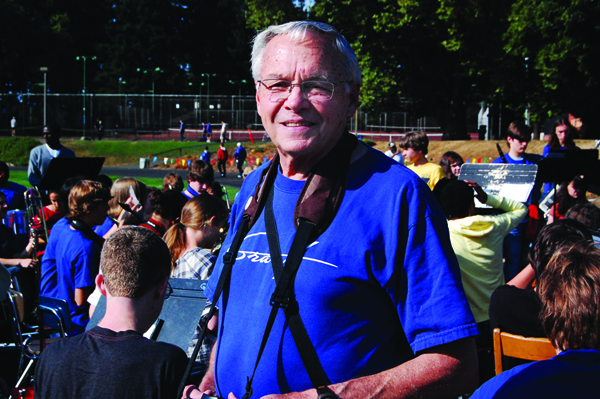Connie Hines remembers how many times she stepped off the school bus in West Linn as a little kid to take that dreaded walk home. She always knew what would happen next and fear became her closest ally when the white boys lined up to chase her.
“We had kids who would wait on the bus and when I got off, they would chase me home,” Hines remembers. “They would call me all kinds of names.”
She was one of the few black girls in her predominantly white, suburban neighborhood. Though she speaks of it coolly, its effect on her is apparent
“I remember that to this very day. That’s something that sticks in my mind,” Hines says now.
Fast forward several decades to the middle of the summer of 2011. Hines sits at a tall table at Applebee’s Restaurant with three students from Grant High School’s Black Student Union. As the club’s new adviser, Hines listens as the girls chatter moves from topic to topic: racism they’ve experienced from the Portland Police Bureau; who the well-connected teachers are at Grant; and other general girl talk.
Hines pays careful attention to what the girls are saying. She works at the school as a para-educator – working with special education students who have behavioral problems. But as advisor to the BSU, she has taken on the new task of getting involved with students who want to make a difference.
“I like being involved with the kids. That’s what the teacher is supposed to be,” says Hines. “All the teachers ask me: ‘Connie, how do you know what the kids like?’ It’s because I listen and I see.”
Hines has seen a lot in her 52 years. Born in Oregon City, she was the oldest of six children. The family later moved to West Linn. But after repeated racist attacks that the police refused to investigate, the family settled in Gladstone.
During her senior year at Gladstone High School, Hines had enough credits so that she could take classes in the morning and work in the afternoon. She was able to work part time in a life skills class at her school as she set her sights on a career in special education. “I wanted to keep doing it so they told me where to go and I’ve been doing it ever since,” she says. “It’s rewarding when you actually have a successful student make it.”
She graduated in 1977 and became a para-educator in the Portland Public School District. While working for the district, Hines earned a business degree from Portland State University. She started her own production company called VIP Entertainment, which helped produce shows for Beyonce and Kanye West. Today, she works as a nanny after school and she’s a volunteer coordinator for a company that organizes races. She does all of this so she can help her two grown daughters buy nice things.
But no matter what she does on the side, Hines says working with students has always been her top priority. “This is really my one and only job,” says Hines.
Hines is truly involved in the Grant community. She organizes assemblies. She volunteers at sports events. At any given day, many students drop in to say hi to her or study in her classroom at lunch. Almost everyone knows who she is.
“Connie is one of these adults at Grant who really is here because she loves working with teenagers, says Principal Vivian Orlen. “She really likes teenagers. She allows them to be teenagers but she also holds them accountable. I think she’s an important adult in this school building.”
Today, Hines is busy with the BSU. Before Hines took over as advisor last year, the entire club was chaotic.
The previous advisor “was very strict. We had to do everything his way,” says Jordan Shellmire, a senior, who is now the president of BSU.
To make matters worse, the original advisor left Grant in the middle of last year. “Because he wasn’t a Grant staff member, he was kind of in and out,” Orlen remembers. “He kind of became, I think, frustrated because sometimes kids would come to meetings, sometimes they wouldn’t come to meetings.”
The club had no direction and a number of its members quit. Shellmire said the club’s leadership positions became less about decision-making and more about titles.
Knowing that the BSU would only continue to struggle with no guiding force, the club’s administration asked Hines to be the adviser. Orlen consulted with Vice Principal Curtis Wilson and the decision was easy.
“Mr. Wilson and I were trying to imagine who else on the faculty could support the students and I think both of us at the same time closed our eyes and said, ‘Ms. Hines,’” Orlen recalls. “We met with her to ask her if she was willing to be the adviser. She didn’t hesitate for a second. Her face lit up and she got really excited.”
Hines had to rebuild the club from scratch. But her presence has been felt far and wide. Membership increased dramatically, going from a low of eight to it’s current roster of 23. And the students in the organization are excited.
“Connie is spontaneous. She’s outgoing. She’s rambunctious. She’s a go-getter,” Shellmire says.
Hines immediately took it upon herself to ensure that the club was active in the community. Within the first few months of being advisor, the club visited Salem and met with state senators and members of the House of Representatives.
At last February’s Black History Month assembly, she tried to push members out of their comfort zones, recruiting a few of them to stand up and give speeches in front of the entire student body.
Shellmire was one of them. “I was more nervous than I’ve ever been. I stumbled over some words and my legs were shaking,” he says. “I was really excited leading up to it, but right as I stepped onto the stage [the nervousness] hit me all at once.”
But Hines’ plan for him worked. “It made me more confident in my ability to speak in public,” he says. “She is like my second mom.”
Hines chuckles at the notion, knowing that her role at BSU is that of mom, advisor, friend, colleague and generalist. She wants the tag to be something else.
“I feel like I’m always someone’s mom,” says Hines. “I want to be a big sister.”
Noting the achievement gap between white students and students of color, Hines also wants to turn the BSU into a force that helps students succeed in school. “I want to see those kids do better with their academics,” she says.
In the meantime, Hines will be beefing up the activity list for the club. This year, she plans to take BSU members hiking, on a horseback-riding trip and to the Newport Bay Aquarium. She also wants to take a group of students on a tour of black colleges and universities.
“A lot of kids don’t get out of their little small world. They don’t get out of their box. They’re just stuck here in Portland,” she says. “That’s my goal: to let them see that there are other things out there.”
She also wants to influence parts of the Grant community, like the Theater Department, that cater mostly to white students. In October, Hines will work with theater teachers and take a group of BSU students and to the Oregon Shakespeare Festival in Ashland to see the all-black performance of King Richard III.
“We’re hoping that [the theater department] will see that we need more African American plays,” Hines says. “That will get more of our African American population involved.”
The little girl who was once too scared to walk home from school now walks proudly through the halls of Grant, beaming about her students’ futures.
“I’m just so glad that my kids have never had to go through that,” she says.



